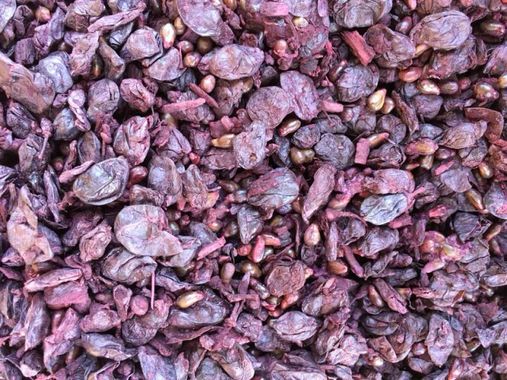What is Marc de raisin?
Marc de raisin, also known as grape marc, is a by-product of the wine-making process. It is the solid part of the grape (skins, pips and stems) that remains after fermentation of the grape juice to produce wine. Although often regarded as a waste product of the wine industry, grape marc is in fact a valuable source of nutrients and compounds beneficial to health.
Origin of Marc de raisin
Marc de raisin has been used for centuries as a dietary supplement in many cultures around the world. Its origins date back to Roman antiquity, when it was used for its medicinal properties. However, it was in France, more specifically in the Cognac region, that Marc de raisin was recognised as a beneficial ingredient for health from the 16th century onwards.
Today, Marc de raisin is produced in many wine-producing countries around the world, including France, Italy, Spain, California and Australia.
The benefits of grape Marc
Grape Marc is a rich source of nutrients, antioxidants and anti-inflammatory compounds. Here are some of its health benefits:
- Powerful antioxidant : Marc de raisin contains polyphenols, plant compounds that act as powerful antioxidants to protect cells from damage caused by free radicals. The polyphenols in Grape Marc are called proanthocyanidin oligomers (OPCs) and are considered more powerful than antioxidants such as vitamin C and vitamin E.
- Blood sugar regulator : Studies have shown that the polyphenols in grape Marc can have a regulating effect on blood sugar levels. This can be particularly beneficial for people with type 2 diabetes.
- Anti-inflammatory effect : The polyphenols and flavonoids present in grape Marc may help to reduce inflammation in the body, which in turn may help to prevent or treat certain chronic diseases such as arthritis and cardiovascular disease.
- Support for cardiovascular health : The OPCs in grape Marc may improve cardiovascular health by reducing inflammation, strengthening blood vessels and helping to regulate blood pressure.
- Protection against neurological diseases : Studies have also shown that the polyphenols in grape Marc may have protective effects against neurological diseases such as Alzheimer's and Parkinson's.
How can Marc de raisin be used as a dietary supplement?
Marc de raisin is generally available as a powder or liquid extract. It can be added to smoothies, fruit juices, yoghurts and cereals, or eaten as is by mixing a tablespoon of powder with water or juice.
The recommended dose of Marc de raisin as a dietary supplement varies according to the form and quality of the product. It is important to follow the manufacturer's instructions or consult a health professional for the appropriate dose.
Precautions and side effects
Marc de raisin is considered safe when taken orally in normal quantities. However, it can interact with certain drugs, particularly anticoagulants and blood pressure medication. It is therefore important to consult a health professional before taking it as a dietary supplement.
Although Marc de raisin is generally well tolerated, side effects such as stomach upset, nausea and diarrhoea can occur in some people. It is advisable to start with small doses and gradually increase the quantity to avoid these effects.
In a nutshell
Marc de raisin is a popular and effective dietary supplement thanks to its many health-boosting properties. It is rich in antioxidants, polyphenols and flavonoids, which can help prevent chronic diseases and improve the body's general health. However, it is important to consult a health professional before including it in your diet as a dietary supplement, especially if you are taking medication.
Sources :
- Aragonès G et al. "Arorutin (OPC) as a dietary supplement: a review of its potential health benefits." Nutritión Hospitalaria. May-June 2010; 25(3):315-327. https://www.redalyc.org/pdf/3091/309125546008.pdf
- Hirt V et al. "Effects of a red grape supplement (Grape Marc) on lipids, inflammation, and markers of insulin resistance in healthy overweight adults." Journal of Nutritional Science. June 2017; 5: e24. https://www.ncbi.nlm.nih.gov/pmc/articles/PMC5490603/
- Bellumori M et al. "Amine and its potential therapeutic properties in the treatment of neurodegenerative diseases." European Journal of Medicinal Chemistry. January 2018; 143 :89-98. https://www.sciencedirect.com/science/article/abs/pii/S0223523416308374











